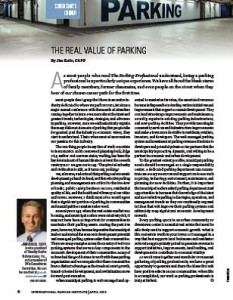As most people who read The Parking Professional understand, being a parking professional is a particularly unique experience. We have all faced the blank stares of family members, former classmates, and even people on the street when they hear of our chosen career path for the first time.
Most people don’t grasp that there is an entire industry dedicated to where we park our cars, let alone a major annual conference with thousands of attendees coming together to learn even more about the latest and greatest trends, technologies, strategies, and advances in parking. However, once we enthusiastically explain the many different elements of parking that people take for granted (and the industry’s economic value), they start to understand. That’s when most of us reconfirm our passion for this industry.
The one thing people in any line of work can relate to is economics. In his renowned planning book, Edge City, author Joel Garreau states,“Parking has been the key determinant of human life since at least the seventh century B.C.” He goes on to say, “The pivot of urbanity and civilization is still, as it turns out, parking.”
We, of course, understand that parking and economic development go hand-in-hand, and that effective parking planning and management are critical to the free flow of traffic, public safety, business success, residential quality of life, and the health and vibrancy of our cities and towns. However, I think most of us would agree that a significant portion of parking in communities and municipalities remains under-used.
Several years ago, when the real estate market was booming and municipal coffers were relatively full, it may not have been as important for communities to maximize their parking assets. During the past five years, however, it has become imperative that municipal leaders understand the economic development potential well-managed parking systems offer their communities. There are many examples across the country of well-run parking systems that serve as key components to the economic development of their communities. Many of us have had the good fortune to work with these parking organizations and we recognize that these communities have a distinct advantage as the trends of smart growth, transit-oriented development, and revitalization move forward post-recession.
When municipal parking is well-managed and operated to maximize its value, the associated revenues become indispensable to funding various initiatives and improvements that support economic development. They can fund streetscape improvements and maintenance, security, repairs to existing parking infrastructure, and new parking facilities. They provide meaningful community services and infrastructure improvements and make a town more desirable to residents, retailers, investors, and developers. The well-managed parking system and investment of parking revenues illustrate to developers and potential private sector partners that the municipality is proactive, dynamic, and willing to be a partner in economic and urban development.
To the greatest extent possible, municipal parking assets should be managed as a single responsibility center. A dedicated parking department can concentrate necessary resources and support on issues such as pricing, technology, enforcement, maintenance, and planning for new facilities. Further, it is important that municipal leaders afford parking department staff opportunities to increase their knowledge of the latest and most effective parking technologies, operations, and management trends so they are continually exposed to ideas that will improve their parking systems and ultimately reap significant economic development rewards.
Every parking space in an urban community or downtown center is essential real estate that must be effectively used to support economic growth. What is this real estate worth in your town? Is it managed in a way that best supports local businesses and residents? Is its value appropriately priced to generate revenue to support initiatives, improvements, land banking, and development to contribute to economic vitality?
As we all come together next month for IPI’s annual gathering of parking professionals, we have a great opportunity to generate and share the ideas that will have positive effects on our communities. When this is accomplished, our work as parking professionals is truly at its best.
Jim Zullo, CAPP, is vice president of Timothy Haahs & Associates, Inc., and a member of IPI’s Consultants Committee. He can be reached at jzullo@timhaahs.com or 484.342.0200.
TPP-2013-04-The Real Value of Parking

